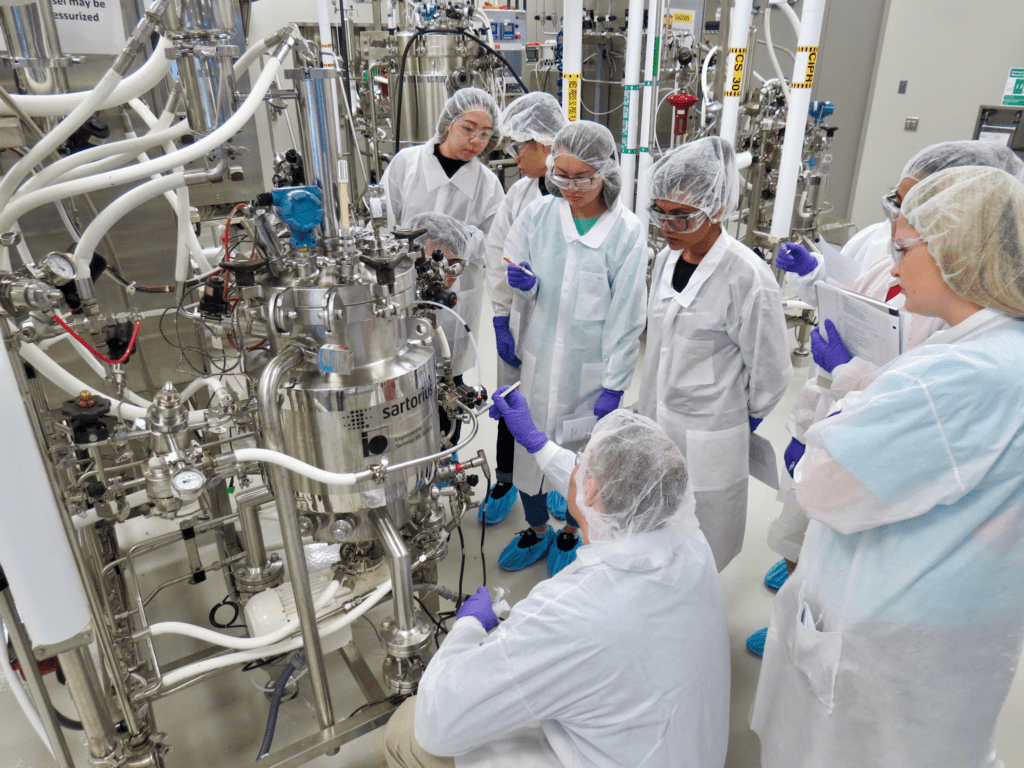It’s pretty common to hear life sciences organizations talk about talent as the linchpin of their success.
But what does it really mean when you hear oft-repeated phrases like, “Our people are our best asset?” More specifically, how do companies that develop and manufacture therapeutics ensure they have continuous access to top talent?
We’ve taken a long look at this in North Carolina, and we’ve found three key factors in building a talent pipeline that can apply to biopharmaceutical manufacturing. These principles are linked by the common threads of a shared vision, collaboration across multiple stakeholders, and patience to see through to an ample, well-trained talent pool.
Having the right talent is essential in fields such as biopharma manufacturing, with its basis in science, precise standards, and regulatory environment. North Carolina’s life sciences industry has made manufacturing talent a priority, in collaboration with state government, universities, community colleges, and existing industry. The payoff has been huge in terms of economic and workforce development: More than 75,000 North Carolinians are employed in life sciences, spread among 810 companies and organizations. From 2018 to 2022, North Carolina life sciences employment grew 13%, third fastest in the nation, according to consulting firm TEConomy Partners.
Here are the three critical factors for talent development, learned over decades of experience, that other states can consider and adapt to their unique circumstances:
Training infrastructure
North Carolina has invested heavily in workforce training to help ensure that biopharma companies operating in the state or considering locating here have access to local talent.

These investments don’t happen in a vacuum, nor do they occur overnight. They require a shared vision, extensive collaboration, and planning between our colleges and universities and our existing companies, backed by state government and a thriving ecosystem of support organizations. Such cooperation yields investments where they need to be made and prevents unnecessary duplication of resources.
Examples include:
- N.C. State University’s Biomanufacturing Training and Education Center (BTEC) trains students and professionals on the latest biomanufacturing technologies.
- N.C. Central University’s Biomanufacturing Research Institute and Technology Enterprise (BRITE) focuses on the changing workforce needs of the North Carolina life sciences industries and clinical research sectors, supporting job creation and economic growth.
- The North Carolina Pharmaceutical Services Network, a collaboration between East Carolina University and Pitt Community College, teaches oral solid dose manufacturing theory and technique.
- The North Carolina Community College System’s BioNetwork partners with community colleges offering training solutions, including a BioWork certificate that prepares students for entry-level roles in biopharma manufacturing.
Each year, North Carolina universities award more than 5,200 biological and biomedical sciences degrees and over 4,600 engineering degrees. The state’s training infrastructure helps ensure they’re ready for employment here without having to go to other states or regions upon graduation.
Community engagement
In 2022, the North Carolina Biotechnology Center (NC Biotech) and its coalition partners won a $25 million award from the U.S. Economic Development Administration’s Build Back Better Regional Challenge (BBBRC). Included in the award, which is designed to accelerate life sciences manufacturing in North Carolina, are resources for engaging communities in awareness of and access to training and job opportunities in life sciences manufacturing. We call it Accelerate NC. The grant funds a multi-prong community engagement project that includes:
- An ambassador program to reach underserved communities across 79 of 100 counties to raise awareness of training and job opportunities
- NC Life Sciences Apprenticeship Consortium (NCLSAC), which places students in on-the-job training through apprenticeships that can lead to full-time employment
- Manufacturing Prep – NCGrads2Work program for training opportunities in oral solid dose medications
- Free life sciences training for participants in a Durham program, including the BioWork certificate program at Durham Technical Community College
Industry investment
Progress in expanding biopharma manufacturing employment would be short-lived if the state’s biopharma companies themselves did not support the effort. This EDA investment allows us, along with our training partners through the Community College System and an HBCU/HAIU network or training hubs, to expand and make more diverse our talent pipeline. Leading companies in North Carolina have made substantial investments in training and development programs that have helped them gain a competitive edge through a highly skilled workforce.
While there are too many companies to cite individually, Novo Nordisk, Amgen, Biogen, FUJIFILM Diosynth Biotechnologies, Pfizer, Thermo Fisher Scientific, and Catalent are among the supporters.
As all these coordinated efforts continue to make progress, more North Carolinians—employees, their families and communities, and especially the patients who need the medications made in the state—will begin to see the benefits of the state’s focus on developing the biopharma talent pipeline.
In North Carolina, we realize we have a good thing going. We hope to inspire others to have the shared vision, collaborative spirit, and patience to advance the life sciences and biopharma manufacturing in their states.




